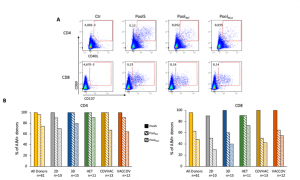In a recent observational study, De Marco, et al., investigated mechanisms of how the Omicron variant of SARS-CoV-2 (B.1.1.529) evades cellular immunity (for more: Changes in SARS-CoV-2 Omicron variant spike protein).
Since emergence, the new SARS-CoV-2 Omicron variant of concern, led to a significant resurgence in global coronavirus disease 2019 (COVID-19. Over 35 mutations in the spike (S) protein of the B1.1.529 variant have been identified which lead to/may confer increased transmissibility and immune-evasion characteristics for this variant.
It has been reported that there is a decreased neutralising potency of sera from vaccinated individuals and previously infected individuals. It is therefore important to understand how immunity to Omicron is established.
The presented study by De Marco, et al., examined the serum from vaccinated individuals in order to investigate T-cell reactivity the Omicron variant’s mutated S regions, in addition to examining T-cell immunity against the whole S protein via peptide stimulation analysis.
The researchers reported a reduction in T-cell responses to the Omicron variant, dependent on the level of and nature of mutations in the S protein of this variant (Figure 1). A significant finding was that there was a decrease in the response of T-cells against a small portion of total protein, and the overall T-cell reactivity to S protein of the new mutant was 83%.

Figure 1: T cell response to the Spike protein. A) Representative flow cytometry plots gated on CD4+ and CD8+ T cells showing up-regulation of activation markers (CD69 and CD40L for CD4+ cells and CD69 and CD137 for CD8 cells) following overnight stimulation with a pool of overlapping peptides covering the whole Spike protein from the ancestral vaccine strain (PoolS), a peptide pool covering only the mutated regions of the Spike protein from the Omicron variant (PoolMut) or a peptide pool covering the same regions as above, but from ancestral strain (PoolRef). B) Percentage individuals in each group presenting CD4+ (left) and CD8+ (right) Spike-specific responses (De Marco, et al., 2021).
It is imported to note that cellular immunity against the whole S protein pool was reported in all of the donors. However, mutations in the S protein of the Omicron variant presented a reduction in T-cell activity by 47%. These findings showed that T-cell responses to the Omicron variant is maintained, irrespective of COVID-19 history or vaccination, and may confer protection from severe disease.
NB to note: bioRxiv is a preprint server which publishes preliminary scientific reports that are not peer-reviewed and, therefore, should not be regarded as conclusive, or guide clinical practice or treated as established information.
Journal article: De Marco, L., et al., 2021. Preserved T cell reactivity to the SARS-CoV-2 Omicron variant indicates continued protection in vaccinated individuals. bioRxiv.
Summary by Stefan Botha










